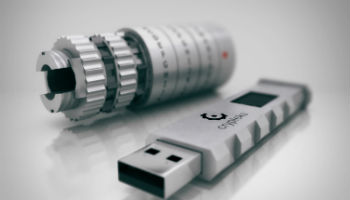Cryptek Secure USB Stick Offers Over 14m Passwords

Cryptek’s new USB stick offers both 256-bit encryption and an exterior locking mechanism
Cryptek has created what it claims to be one of the first ever physically lockable and encrypted USB drives.
The robust USB stick features 256-bit Advanced Encryption Standard (AES) encryption and can be physically protected with any one of the 14,348,907 possible combinations of pass code.
Double Locking
 The physical protection is provided by a series of outer rings and setting a password is designed to be very secure while also being simple to use.
The physical protection is provided by a series of outer rings and setting a password is designed to be very secure while also being simple to use.
Once the USB stick has been removed from the housing, users can slide off all the outer rings and simply insert the rings in the new code you want to use aligned with the red dots.
If you forget your outer password, then Cryptek will offer a “ring change” service for anyone who accidentally forgets it, but if you forget your encryption password, there is nothing they can do due to the difficulty of cracking the AES encryption, which is approved by the NSA to handle up to Top Secret data.
The stick itself is compact with dimensions of just 3.1” x 1.1” but is designed to be heavy duty. Inner parts are made from aluminium alloy while all other components are made from state of the art technologies. Custom springs are manufactured from stainless spring steel and are designed to allow for stop-motion when turning the outer rings of the device.
The stick comes in 4GB, 8GB and 16GB capacities and boasts read speeds of up to 24Mbps and write speeds of up to 10Mbps. It is also possible to set the number of wrong attempts that can be made to access your information before it auto-formats.
Kickstarting
Crypteks’ Kickstart page that was set up to help begin the expensive manufacturing process and help bring costs down has received overwhelming support for the project. At the time of writing, 455 people have contributed $78,774 (£50,491), far exceeding the $12,000 (£7,691) target set by developers.
An 8GB stick costs $130 (£83), a 16GB costing $160 (£103), while businesses who pledge $7,400 (£4,741) can become an enterprise sponsor and receive 50 16GB memory sticks, an option which might be recommended for many UK organisations.
In the last two years, UK employees have lost more than 17,000 staff and customer records on USB sticks, adding strength to the argument that a stray USB can ruin even the most secure of networks.
ViaSat’s Eclypt Nano memory sticks were the first such devices to be approved by the UK government’s technical security advisor Communications Electronic Security Group (CESG) to handle data classified as “secret” or “top secret”, but Kingston was embarrassingly forced to admit that a number of its encrypted USB sticks were susceptible to hacks.